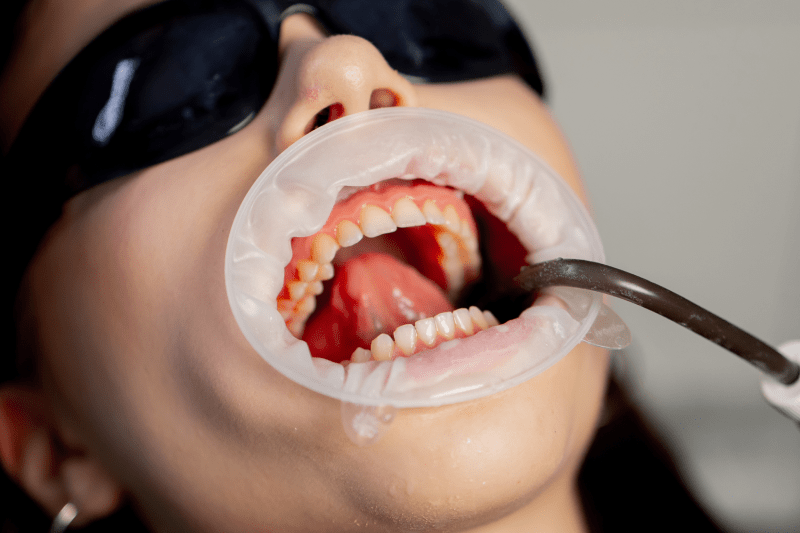What Exactly Is Root Canal Treatment And Why Is It Performed?
Root canal treatment is a procedure applied when the soft tissue inside the tooth, called the pulp (nerves, blood vessels, and connective tissue), becomes irreversibly inflamed or infected. Infection due to deep cavities, fractures, or cracks in the tooth can cause severe pain and an abscess. The purpose of the treatment is to clean the damaged pulp, disinfect it, and then hermetically seal the canals with special filling materials to save the tooth. This allows the tooth to remain in the mouth and continue its normal functions, preventing the need for extraction.
Why Are Root Canal Treatment Prices More Affordable In Turkey?
The main reasons why root canal treatment prices in Turkey are more affordable compared to Western countries are the generally lower operating and personnel costs, government support for health tourism, and competitive exchange rates. The quality of the treatment or the standards of the materials used are not affected by this difference. Many clinics in Istanbul hold international accreditations and use the same high-quality equipment and advanced technology. These affordable prices make the treatment attractive to patients coming from abroad.
What Is The Cost Of Root Canal Treatment In Istanbul?
The cost of root canal treatment in Istanbul varies depending on the location of the tooth (anterior teeth are easier, molars are more difficult and have more canals), the number of canals, whether the tooth has been previously treated, and whether the treatment will be completed in one or multiple sessions. Additionally, the filling or crown procedures that follow the treatment also affect the total cost. When researching prices for a quality clinic, it is important to consider the services included in the package and the technology utilized.
Is Root Canal Treatment A Painful Procedure?
Since root canal treatment is performed under local anesthesia, the patient does not feel any pain or discomfort during the procedure. Anesthesia ensures that the infected area is completely numb. It is normal to feel slight sensitivity or pain in the first few days after the treatment, but this condition is usually easily managed with standard painkillers prescribed by the doctor. Since the actual source of the pain is the infection itself, the pain completely disappears once the infection is eliminated after the treatment.
How Many Sessions Does Root Canal Treatment Take?
Root canal treatment is usually completed in a ** single session**, depending on the condition of the tooth and the severity of the infection. For simple and uncomplicated teeth, this period can range from 30 minutes to 1 hour. However, if there is a large abscess or advanced infection at the tooth root, more than one session may be necessary to fully clean the infection. In these cases, medication is placed in the canals, and the treatment is finalized after the tooth is expected to heal completely.
Which Types Of Dental Crowns Are Used After Root Canal Treatment?
Since the fragility of the tooth may increase after root canal treatment, especially for molars subjected to high chewing forces, the application of a crown (cap) is often recommended. Popular crown types used include Zirconia, Porcelain (metal-supported or metal-free), and E-max. Zirconia and E-max crowns are often preferred because they offer a highly aesthetic appearance and durability. Which type of crown is most suitable is determined based on the tooth’s location and the patient’s aesthetic expectations.
What Should Be Done If Root Canal Treatment Fails?
In the event of root canal treatment failure (e.g., recurrence of infection or incomplete cleaning of the canal), generally retreatment is applied. In this procedure, the old filling materials are removed, the canals are cleaned and disinfected again. In rare cases, a surgical procedure at the root tip called Apical Resection may be necessary. The cause of the failure must be accurately determined, and the treatment plan should be updated accordingly to maximize the chances of saving the tooth.
How Long Does Root Canal Treatment Take?
The root canal treatment procedure generally takes between 30 minutes and 90 minutes for a single session. This duration depends on the complexity of the tooth (e.g., multiple canals in molars), the level of infection, and the sophistication of the equipment used by the practitioner. Modern clinics in Istanbul can usually perform the treatment faster and more effectively using rotary instruments and digital imaging technologies. The short treatment duration provides great comfort for international patients.

How Long Does The Recovery Take After Root Canal Treatment?
The recovery process after root canal treatment is generally fast. Mild sensitivity may last for a few days after the procedure. The tooth usually returns completely to normal and regains its full function within a few days. If there was a large abscess at the tooth root, the healing of this abscess tissue may take several weeks or months, but the patient can return to daily life immediately. It is important for the doctor to follow up to confirm that the tooth is completely healed and the infection is fully eliminated.
Is There A Risk Of Tooth Fracture After Root Canal Treatment?
Since the pulp tissue inside the tooth undergoing root canal treatment is removed, the tooth’s blood supply is cut off, and it naturally becomes more fragile. The risk of fracture is high, especially in teeth with intense chewing force, such as molars. To minimize this risk, dentists strongly recommend placing a crown (cap) to protect root canal-treated teeth with significant material loss. The crown protects the tooth against external forces, extending its lifespan.
Why Should Istanbul Be Preferred For Root Canal Treatment?
Istanbul has become one of the leading centers for dental tourism worldwide. The reasons for this include state-of-the-art equipment (microscopes, digital X-ray, rotary instrument systems), expert dentists with international experience, and affordable costs offered despite Western-standard quality. Choosing Istanbul not only allows you to receive high-quality treatment but also offers the opportunity to experience a historical and cultural journey. You can benefit from these advantages by contacting Cure Holiday.
Who Needs Root Canal Treatment?
Individuals who need root canal treatment are generally those experiencing severe tooth pain, especially night pain. Symptoms such as prolonged sensitivity to cold and heat, swelling in the gums, abscess formation in the face or jaw, pain during chewing, or discoloration of the tooth may also indicate the necessity of root canal treatment. In cases where the tooth’s nerves are irreversibly damaged, root canal treatment is the only option to save the tooth instead of extracting it.
What Happens If Root Canal Treatment Is Not Performed?
If root canal treatment is not performed, the infection inside the tooth continues to progress and spreads from the root tip to the jawbone. This leads to the formation of a dental abscess and the loss of surrounding bone tissue. There is a risk of the infection spreading throughout the body, which can adversely affect general health. Progressive bone loss causes the tooth to loosen and eventually makes extraction necessary. Root canal treatment, which is the only way to save the tooth, prevents these negative outcomes.
Is Root Canal Treatment Done On Children’s Baby Teeth?
Yes, a procedure similar to root canal treatment, called pulpotomy or pulpectomy, is also applied to baby teeth in children that have pulp damage due to decay. The purpose of these procedures is to keep the baby tooth in the mouth until the permanent tooth underneath is ready to erupt. Since the early loss of baby teeth can cause crowding and space loss in permanent teeth, preserving baby teeth is of great importance.
What Preparations Should Be Made Before Root Canal Treatment?
A special preparation process is usually not required before root canal treatment, but it is important for the patient to inform their doctor about all medications they are taking, especially blood thinners, and any chronic illnesses (diabetes, heart conditions). Before the treatment, the dentist performs radiographic imaging (X-ray) to determine the extent of the infection. Taking antibiotics or painkillers before the procedure, as advised by the dentist, can make the treatment more comfortable.
Which Teeth Are More Suitable For Root Canal Treatment?
The teeth most suitable for root canal treatment are those that have pulp damage due to decay or trauma but have sufficient bone support around the root and a sound overall structure. Root canal treatment is generally preferred if the crown portion of the tooth has not lost too much material and can be salvaged with restoration. Extraction may be more suitable for teeth that are severely damaged, have multiple root fractures, or have excessively reduced bone support.
What Is The Importance Of Using A Microscope In Root Canal Treatment?
The use of a microscope in root canal treatment is a critical technology that significantly increases treatment success. The dentist can see the inside of the root canals under high magnification and illumination thanks to the microscope. This allows for the identification and cleaning of narrow, curved, or extra canals that are invisible to the naked eye. Microscope use ensures the treatment is performed more precisely, completely, and safely, minimizing the risk of recurrence. This technology is standard in quality clinics in Istanbul.
Does The Tooth’s Color Change After Root Canal Treatment?
In some old treatment methods or due to trauma, discoloration of the tooth could be observed after root canal treatment. However, with the use of modern techniques and correct canal filling materials today, the risk of tooth discoloration is quite low. If discoloration occurs, the problem can be easily resolved with the internal bleaching method applied from inside the tooth. These aesthetic issues are readily managed by expert dentists.
What Is The Lifespan Of A Root Canal-Treated Tooth?
A tooth that has successfully undergone root canal treatment and been properly restored with a filling or crown afterwards can remain in the mouth for a lifetime, just like a normal tooth. The permanence of the treatment largely depends on the patient’s oral hygiene and regular dental check-ups. Root canal treatment saves the tooth from extraction, ensuring that your own natural tooth root is preserved and continues to function.
When Should A Crown Be Placed On A Root Canal-Treated Tooth?
The placement of a crown (cap) on a root canal-treated tooth should generally be planned immediately after the treatment, within the first few weeks after the sensitivity in the tooth’s nerve and root area has completely subsided. The crown should be placed as soon as possible, especially on molars in the back area that bear heavy chewing load, to prevent the tooth from fracturing. If the tooth has little material loss, sometimes only a strong filling (onlay or inlay) may be sufficient; however, this decision must be made by the dentist.

Can Root Canal Treatment Be Done During Pregnancy?
Yes, root canal treatment can generally be performed safely during pregnancy, especially if the infection requires urgent treatment. The second trimester (4-6 months) is generally considered the safest period. Local anesthesia poses no risk to the mother and the baby. For radiographic imaging (X-ray), the procedure is performed with a minimal radiation dose using a lead apron and modern digital systems. Postponing the treatment is not recommended as it increases the risk of the infection spreading.
What Are The Touristic Advantages Related To Root Canal Treatment?
The touristic advantage of receiving root canal treatment in Istanbul is combining high-quality dental care with vacation and cultural exploration. After this short treatment, patients can spend their recovery period exploring Istanbul’s historical texture, magnificent views, and modern life. Organizations made with Cure Holiday, including accommodation and transfer services in the treatment package, make this experience both comfortable and affordable.
Can A Root Canal-Treated Tooth Decay?
A tooth that has undergone root canal treatment, even if the pulp tissue has been removed, can still decay. Root canal treatment cleans the infection inside the tooth but does not protect the outer surface of the tooth against decay. The outer surface of the tooth can decay again, just like other teeth, due to improper brushing or sugary food consumption. Therefore, regular and meticulous oral hygiene must be maintained for teeth that have undergone root canal treatment.
Which Foods Should Be Avoided After Root Canal Treatment?
Until the root canal treatment is completed and a permanent filling or crown is placed on the tooth, hard, sticky, and very hot/cold foods should be strictly avoided on that tooth. The tooth can be sensitive and prone to fragility after the treatment. Hard foods can cause the temporary filling to fall out or the tooth to fracture. Normal eating can be resumed once the permanent crown is fitted.
Is The Brand Of Implants Used In Root Canal Treatment Important?
In root canal treatment, the canal filling materials, rotary files, and disinfectant solutions used are important, not the implant brand. However, if the tooth cannot be saved and an implant is required instead, then the implant brand becomes important. Reliable clinics in Istanbul use biocompatible and proven materials that comply with international standards. The quality of the materials used in the treatment directly affects the risk of post-procedure infection and the tooth’s longevity.
How Often Should Dentist Check-ups Be Done After Root Canal Treatment?
After the root canal treatment is completed, control X-rays should be taken at intervals determined by the doctor (usually after 6 months or 1 year) to monitor whether the tooth root tip has fully healed. In these check-ups, the condition of the tooth, the permanence of the canal filling, and bone healing in the surrounding tissue are evaluated. Routine dental check-ups at least twice a year are also mandatory to prolong the lifespan of root canal-treated teeth.
What Are The Most Common Causes Of Root Canal Treatment Failure?
The most common causes of root canal treatment failure include incomplete cleaning of the root canals (overlooked, narrow, or curved canals), insufficient or leaking canal filling, and the tooth not being properly protected against fragility (no crown placement). Additionally, new decay that develops after the treatment can also lead to infection recurrence. These risks are minimized by using advanced technologies like microscopes in the treatment.
When Does The Pain In A Root Canal-Treated Tooth Go Away?
The main purpose of root canal treatment is to eliminate the pain caused by the infection. The sensitivity and mild pain felt after the treatment usually subside within 2-3 days. If severe pain or sensitivity during chewing persists for longer than a week, or if a new swelling occurs, this may indicate that the infection has not been completely cleared, and a dentist should be consulted immediately.
Which Advanced Technologies Are Used In Root Canal Treatment?
Modern clinics in Istanbul use advanced technologies such as Dental Microscopes, RVG (Digital Radiovisiography) for instant and low-dose imaging, Apex Locator devices that accurately measure the length of the root canals, and Rotary Instrument Systems that effectively clean the canals, to increase the success of root canal treatment. These technologies enhance the predictability of the treatment and ensure the canals are cleaned down to the finest detail.
Is A Root Canal-Treated Tooth Extracted?
Root canal treatment is the last resort treatment applied to save the tooth from extraction. A tooth that has been successfully treated and properly restored does not need to be extracted. However, in rare and advanced cases where the infection cannot be stopped despite treatment, there is significant bone loss at the root tip, or the tooth is fractured vertically, extraction may unfortunately become necessary.

How Long Is It Necessary To Stay In Istanbul For Root Canal Treatment?
Since root canal treatment is usually completed in a single session, the duration international patients need to stay in Istanbul is quite short. Including the procedure and the check-up the next day, a stay of generally 2 to 3 days in Istanbul is sufficient. If multiple teeth need treatment or if additional procedures like crowning are planned, this period may be longer. You can optimize your travel time according to the treatment with Cure Holiday.
Is Antibiotic Use Required Before Root Canal Treatment?
Antibiotic use before root canal treatment is not necessary for every patient. Antibiotics are usually started at the discretion of the physician only in cases where the infection has spread to the jawbone or face, with severe swelling and systemic symptoms (fever, malaise). Antibiotics help reduce the infection and facilitate the treatment, but they do not eliminate the primary source of the infection (the pulp); mechanical cleaning (root canal treatment) is mandatory for this.
Is Tooth Sensitivity Normal After Root Canal Treatment?
Yes, it is quite normal to experience temporary sensitivity and a slight pressure sensation in the tooth after root canal treatment. This sensitivity is the adaptation process of the tooth and its surrounding tissues due to the cleaning of the nerves and filling of the canals with new materials. This condition usually subsides on its own within a few days. Severe sensitivity or pain that lasts long is a situation that requires contacting your doctor.
What Is The Difference Between Root Canal Cost And Extraction And Implant Costs?
Root canal treatment, because it saves the tooth, is generally more cost-effective than tooth extraction and implant treatment. Tooth extraction followed by implant placement is both a longer process and results in a higher total cost due to the costs of the implant itself, the surgery, and the crown. Root canal treatment is also the best biological solution as it preserves your own natural tooth, and the initial cost is the lowest.
How Should Oral Hygiene Be After Root Canal Treatment?
Oral hygiene after root canal treatment must be maintained with the same meticulousness applied to all your other teeth. You must ensure that the area under the filling and crown of the treated tooth remains clean by gently brushing around the tooth and using dental floss. Avoid excessive pressure on the treated area in the first few days. Good hygiene prevents the risk of reinfection and the formation of new decay.
How To Start The Treatment Process With Cure Holiday?
The first step to starting your root canal treatment process in Istanbul with Cure Holiday is to request a free consultation via their website or communication channels. Experienced consultants evaluate your existing dental X-rays or photos. They then select the most suitable expert physician and high-quality clinic for you, and present your treatment plan, estimated cost, and travel package details. If you approve the plan, all your reservations and transfer organizations are seamlessly handled.
Can Bleaching Be Applied To A Root Canal-Treated Tooth?
Yes, if discoloration or darkening occurs in a tooth that has undergone root canal treatment, a special bleaching method called internal bleaching can be applied to correct the color of this tooth. This procedure is performed by placing a whitening gel inside the tooth. In cases where the desired result cannot be achieved with standard external bleaching, a natural and aesthetic color match can be obtained with the internal bleaching technique.
Would you like to save your tooth by receiving high-quality, comfortable, and affordable root canal treatment in Istanbul? Contact Cure Holiday immediately to create your personalized treatment plan.



